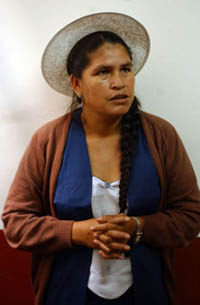 Leonida Zurita
Leonida Zurita Leonida Zurita
Leonida Zurita
Leonida Zurita was born in the Chapare (Chipiriri) on April 22, 1969. Her parents were migrants from the highland Cochabamba valley regions of Sacaba and Colomi. She has four older living brothers (all ex-union leaders) and one sister. Two other siblings died at very young ages. Leonida herself has a cocalero husband and two sons, ages 14 and seven. In the last three years, Leonida has lost two babies, each in the last month of pregnancy, due to inadequate health services in the Chapare. In the very macho world of Bolivia in general, and the Chapare in particular, it is remarkable how supportive her male predominant nuclear family is of her leadership and public life. Leonida’s father died when she was two years old and her mother (another amazing woman) faced the task of raising her six surviving children alone. Despite these challenges, Leonida was able to attend the first three years of primary school in the Chapare, then went to Cochabamba city to finish primary (five years), three years of intermediary and one year of secondary schooling. She is now working toward her high school equivalency exam.
When she was 17, the US and Bolivian governments offered coca growers alternative development for voluntarily eradicating their coca. Leonida’s mother partook of this failed endeavor, losing all her investment and income and Leonida had to drop out of school to help on the family farm in the Chapare. “Because of (failed) alternative development I had to leave school and dedicate my time to agricultural and union activities with my mother.” This was one of the first real lessons in her young life and perhaps the best ever outcome of failed alternative development! Leonida’s mother, as the widow of an ex-cocalero union member, had the right and obligation to participate in his Federation. Starting in 1991-92, Leonida helped, first cooking for and cleaning up after the men’s meetings, then in 1994 she was named Secretary of Minutes (Actas) of the male federation! In 1995, she formed the first women’s federation in the Chapare and encouraging women from the other nearby areas, soon there were women’s federations parallel to all the men’s organizations. In 1997, COCAMTROP (The Coordinating Committee of the Six Women Peasant Federations of the Tropics) was formed under Leonida’s leadership and she continues to be democratically re-elected every two years. From 2001-3, Leonida also held the office of Secretary General of the National Women’s Peasant Movement Bartolina Sisa, bringing that organization international attention.
Leonida has traveled extensively abroad, including Prague, Rome, Porto Alegre, Quito, Lima, Caracas, Havana, Mexico City and the US on four tours sponsored respectively by the Women’s International League for Peace and Freedom, The Kensington Welfare Rights Union Poor People’s March, People’s Global Action, and most recently Harvard University’s Kennedy School. Last year, Leonida was a candidate for the RFKennedy Human Rights Award. Leonida is now running for Congress in Bolivia’s upcoming December elections, having been chosen by her own bases for this new challenge. Her “bases” are anxious for Leonida to remain close to them and also expand her influence through the national electoral process and office. Already, she is recognized as the most important peasant women leader in the country, receiving national awards and invitations from government and non-governmental sources alike. Leonida is also the only woman who participates in the dialogue process between the Government of Bolivia and the coca growers. In summary, Leonida Zurita is the most effective and credible Bolivian peasant woman leader since Bartolina Sisa (18th century independence fighter). And her integrity is already legend, in a county known for corruption.